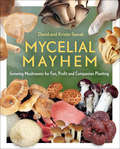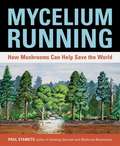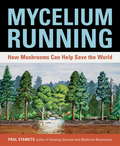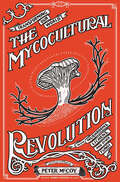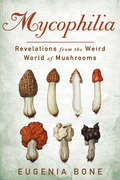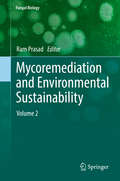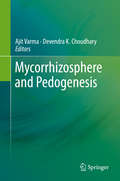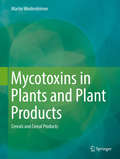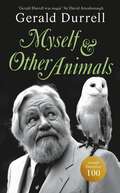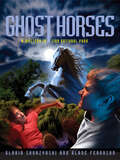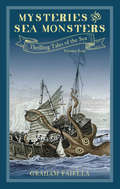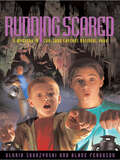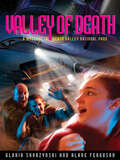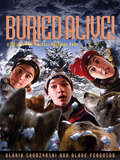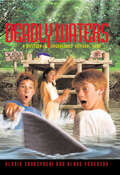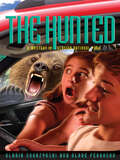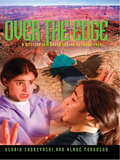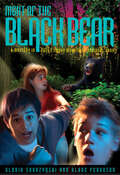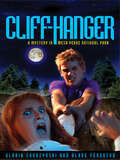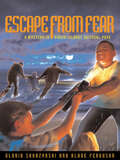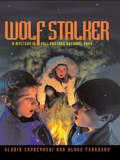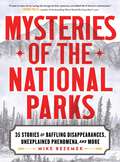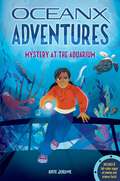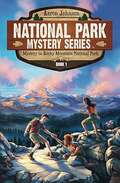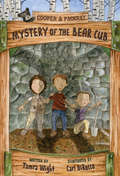- Table View
- List View
Mycelial Mayhem: Growing Mushrooms for Fun, Profit and Companion Planting
by Kristin Sewak David Sewak“A comprehensive and personal tome on the production, business, promotion, and problem solving for the independent mushroom grower.” —Taylor Lockwood, renowned mushroom expert & photographerMost supermarket mushrooms are bland and boring; products of an industrial process which typically relies on expensive equipment and harmful pesticides. Many people would like to add more flavorful and diverse fungi to their diets, but lack the knowledge or confidence to gather or grow their own. Do-it-yourself cultivation is a fun, exciting way to incorporate a variety of mushrooms into a sustainable lifestyle.Mycelial Mayhem is a straightforward, no-nonsense resource for the aspiring mushroom grower. This practical guide cuts through much of the confusion surrounding methods and techniques, helping the hobbyist or farmer to:Select regionally appropriate species for the home garden, farm-scale production, or an edible landscapePractice sustainable, environmentally friendly cultivation techniques, such as companion planting, to combat common garden pests and diseasesChoose a successful, proven business approach to maximize profit and minimize frustrationMany people find that DIY mushroom cultivation is not nearly as complicated as they expect, but a knowledgeable and experienced mentor is crucial to success. Whether your goal is to harvest homegrown gourmet mushrooms for your table, supplement your income by selling to friends and neighbors, or start a full-fledged niche business, Mycelial Mayhem is packed with the advice and resources you need to succeed with this rewarding and valuable crop.“After reading Mycelial Mayhem’s approachable primer to this age-old art I’m ready to invite the mysterious and captivating kingdom of fungi right into my own home.” —Langdon Cook, author of The Mushroom Hunters
Mycelium Running
by Paul StamentsMycelium Runningis a manual for the mycological rescue of the planet. That's right: growing moremushroomsmay be the best thing we can do to save the environment, and in this groundbreaking text from mushroom expert Paul Stamets, you'll find out how. The basic science goes like this: Microscopic cells called "mycelium"--the fruit of which are mushrooms--recycle carbon, nitrogen, and other essential elements as they break down plant and animal debris in the creation of rich new soil. What Stamets has discovered is that we can capitalize on mycelium's digestive power and target it to decompose toxic wastes and pollutants (mycoremediation), catch and reduce silt from streambeds and pathogens from agricultural watersheds (mycofiltration), control insect populations (mycopesticides), and generally enhance the health of our forests and gardens (mycoforestry and myco-gardening). In this comprehensive guide, you'll find chapters detailing each of these four exciting branches of what Stamets has coined "mycorestoration," as well as chapters on the medicinal and nutritional properties of mushrooms, inoculation methods, log and stump culture, and species selection for various environmental purposes. Heavily referenced and beautifully illustrated, this book is destined to be a classic reference for bemushroomed generations to come.
Mycelium Running: How Mushrooms Can Help Save the World
by Paul StametsMycelium Running is a manual for the mycological rescue of the planet. That’s right: growing more mushrooms may be the best thing we can do to save the environment, and in this groundbreaking text from mushroom expert Paul Stamets, you’ll find out how. The basic science goes like this: Microscopic cells called “mycelium”--the fruit of which are mushrooms--recycle carbon, nitrogen, and other essential elements as they break down plant and animal debris in the creation of rich new soil. What Stamets has discovered is that we can capitalize on mycelium’s digestive power and target it to decompose toxic wastes and pollutants (mycoremediation), catch and reduce silt from streambeds and pathogens from agricultural watersheds (mycofiltration), control insect populations (mycopesticides), and generally enhance the health of our forests and gardens (mycoforestry and myco-gardening). In this comprehensive guide, you’ll find chapters detailing each of these four exciting branches of what Stamets has coined “mycorestoration,” as well as chapters on the medicinal and nutritional properties of mushrooms, inoculation methods, log and stump culture, and species selection for various environmental purposes. Heavily referenced and beautifully illustrated, this book is destined to be a classic reference for bemushroomed generations to come.From the Trade Paperback edition.
Mycocultural Revolution, The: Transforming Our World with Mushrooms, Lichens, and Other Fungi
by Peter McCoyDiscover the glorious world of mushrooms, lichens, and micro fungi, as described by Peter McCoy, one of today&’s foremost experts in the field. Covering the essential information and skills for identifying, cultivating, and celebrating the uniqueness of fungi, this book enables anyone to quickly and easily engage in the art and science of mycology—the study of fungi. Mycology offers vast opportunities to enhance our lives, support our communities, and heal the environment. This first-of-its-kind introductory text is accessible for anyone just getting started in mycology, as well as for those seeking a fresh perspective on this important science.Learn general mycological facts, essential information and skills for identifying common mushroom types, foraging tips, delicious recipes, a growing guide, mycoremediation (using fungi to treat contaminated areas in our environment), mushroom-based crafts, and so much more!With a foreword by Robert Rogers, author of The Fungal Pharmacy.
Mycophilia: Revelations from the Weird World of Mushrooms
by Eugenia BoneAn incredibly versatile cooking ingredient containing an abundance of vitamins, minerals, and possibly cancer-fighting properties, mushrooms are among the most expensive and sought-after foods on the planet. Yet when it comes to fungi, culinary uses are only the tip of the iceberg. Throughout history fungus has been prized for its diverse properties—medicinal, ecological, even recreational—and has spawned its own quirky subculture dedicated to exploring the weird biology and celebrating the unique role it plays on earth. In Mycophilia, accomplished food writer and cookbook author Eugenia Bone examines the role of fungi as exotic delicacy, curative, poison, and hallucinogen, and ultimately discovers that a greater understanding of fungi is key to facing many challenges of the 21st century.Engrossing, surprising, and packed with up-to-date science and cultural exploration, Mycophilia is part narrative and part primer for foodies, science buffs, environmental advocates, and anyone interested in learning a lot about one of the least understood and most curious organisms in nature.
Mycoremediation and Environmental Sustainability: Volume 2 (Fungal Biology)
by Ram PrasadBioremediation is the use of microorganisms' metabolism to degrade waste contaminants (sewage, domestic, and industrial effluents) into non-toxic or less toxic materials by natural biological processes. Volume 2 offers new discussion of remediation through fungi—or mycoremediation—and its multifarious possibilities in applied remediation engineering and the future of environmental sustainability. Fungi have the biochemical and ecological capability to degrade environmental organic chemicals and to decrease the risk associated with metals, semi-metals, noble metals, and radionuclides, either by chemical modification or by manipulating chemical bioavailability. Additional expanded texts shows the capability of these fungi to form extended mycelia networks, the low specificity of their catabolic enzymes, and their use against pollutants as a growth substrate, making these fungi well suited for bioremediation processes. Their mycelia exhibit the robustness of adapting to highly limiting environmental conditions often experienced in the presence of persistent pollutants, which makes them more useful compared to other microbes. Despite dominating the living biomass in soil and being abundant in aquatic ecosystems, however, fungi have not been exploited for the bioremediation of such environments until this added Volume 2. This book covers the various types of fungi and associated fungal processes used to clean up waste and wastewaters in contaminated environments and discusses future potential applications.
Mycorrhizosphere and Pedogenesis
by Ajit Varma Devendra K. ChoudharyThe present book highlights importance of mycorrhiza in soil genesis wherein it reflects mycorrhizal occurrence and diversity, various tools to characterize them and its impact on soil formation/health together with crop productivity. The edited compendium provides glimpses on the mycorrhizal fungi and their prominent role in nutrient transfer into host plants, and presenting view on application of mycorrhiza for crop biofortification. It focuses on the mechanisms involve in weathering process employed by mycorrhiza with highlighting the current and advanced molecular approaches for studying mycorrhizal diversity. Further, book emphasizes following aspects in details: significance of AMF in phytoremediation of hydrocarbon contaminated sites, the role of mycorrhiza in soil genesis using scientometric approach, the concept of mycorrhizosphere, xenobiotic metabolism, molecular approaches for detoxifying the organic xenobiotics and the role of mycorrhizosphere in stabilizing the environment in an eco-friendly way. In addition, the book will be benign to researchers that involved in mycorrhiza characterization especially by deploying metagenomics/PCR based and non PCR based molecular techniques that may be utilized to study the microbial diversity and structure within the mycorrhizosphere.
Mycotoxins in Plants and Plant Products
by Martin WeidenbörnerThis book provides detailed data and information about the cereals and cereal products that are affected by mycotoxins, and gives a basic overview of mycotoxins in these foodstuffs. Mycotoxin contamination of food occurs as a result of crop invasion by field fungi such as Fusarium spp. and Alternaria spp. , or storage fungi such as Aspergillus spp. and Penicillium spp. , which can grow on/in stored commodities and are able to produce mycotoxins. In the worst case, these fungi produce secondary metabolites called mycotoxins, which can be very harmful to humans and animals when, for example, they are consumed through food due to their various negative effects on several organs in both humans and animals. Mycotoxins in Plants and Plant Products: Cereals and Cereal Products lists the predisposition of a foodstuff for mycotoxin contamination, as well as the degree of contamination, concentration, and country of detection/origin for each case of mycotoxin contamination of this kind of foodstuff. It includes both alphabetical and numerical lists of literature.
Myself and Other Animals: A posthumous work from the beloved conservationist to celebrate the centenary of his birth
by Gerald DurrellA posthumous work from the beloved conservationist and naturalist Gerald Durrell, to celebrate the centenary of his birth, with a new foreword by HRH Princess Anne.‘Gerald Durrell was magic’ SIR DAVID ATTENBOROUGH ‘A wise, genial and world-encompassing book’ SUNDAY TIMES ‘Fills important gaps in the biographical narrative . . . Truly, there is magic here’ GUARDIAN Myself and Other Animals is a new book mosaicked from unpublished autobiographies, uncollected pieces and previously published extracts from Durrell’s work and archives. The result is an extraordinary journey through Durrell’s life in his own words, edited and introduced by his widow Lee Durrell.Drawing on a memoir that Durrell started writing before he became too ill to continue it, and an unfinished book from a trip to Australia in 1969 to the Great Barrier Reef, Northern Territory and Queensland, here is the unvarnished story of Durrell’s life, from touching family tributes to golden bats and pink pigeons.Moving from India to England and then to the always sun-lit Corfu, told with dry wit and insight into our fellow animals, here is the vivid finale of one of Britain’s most beloved conservationists and prose stylists.'Funny and readable and hugely charming' i ‘One of the finest and most lyrical nature writers in English’ OBSERVER'A moving tribute to Gerald's endeavours and achievements as a conservationist' SPECTATOR
Mysteries In Our National Parks: A Mystery in Zion National Park (Mysteries in Our National Park)
by Alane FergusonLife-threatening accidents keep plaguing the Landon family as they investigate the mysterious deaths of white mustangs at Zion National Park in Utah. Even before they get to the park, Jack Landon knows that Ethan Ingawanup spells trouble. Things start to go awry after Ethan and his sister-two Shoshone kids-are placed in the Landons' care. The questions begin to mount after Ethan teaches Jack and Ashley the ancient Ghost Dance: Are all the hair-raising events just coincidental? Or is there some strange magic in the dance ritual? The answers await in the raging waters of a slick-rock canyon called The Narrows. The afterword by Lyman Hafen of the Zion Natural History Association discusses white mustangs and public lands in Utah.
Mysteries and Sea Monsters: Thrilling Tales of the Sea (vol.4) (Thrilling Tales of the Sea #4)
by Graham FaiellaThe sea realm has ever been mysterious: strange happenings upon it, an unfathomable abyss of ‘The Great Unknown’ below. Before the scrutiny of scientific Enlightenment and Age of Reason, in the eighteenth century, ghost ships and oceanic monsters were the stuff of superstition, myth and legend to explain the inexplicable, to enthral the imagination – and enliven the unimaginable.Narratives of phantom ships manned by ghostly (sometimes skeletal) crews, or damned like the Flying Dutchman to roam the seas forever; of sinister, sinuous sea serpents; and the lore of the terrible multi-tentacled kraken. Accounts inspired spirited controversy amongst believers and sceptics, in the awestruck thrill of such frightful enigmas.
Mysteries in Our National Parks: A Mystery in Carlsbad Caverns National Park (Mysteries in Our National Park)
by Gloria Skurzynski Alane FergusonJack and Ashley&’s search for eight-year-old Sammy has left them hopelessly lost in a twisted maze of tunnels deep inside Carlsbad Caverns. Bats are everywhere, and the echoes of their screeching cries sends a chill through the trio. The only light is the candle in their lantern. What will happen when it burns out, leaving them in total darkness?
Mysteries in Our National Parks: A Mystery in Death Valley National Park (Mysteries in Our National Park)
by Alane FergusonJack can&’t believe what he&’s hearing. His sister is being held hostage. Whoever snatched Ashley must have been following the Landons as they explored Death Valley National Park. But what do they want with Leesa? When Jack discovers why Leesa is on the run, he is determined to protect her. But how can he do that and save Ashley, too? One thing he knows for sure, failure is not an option.National Geographic supports K-12 educators with ELA Common Core Resources.Visit www.natgeoed.org/commoncore for more information.
Mysteries in Our National Parks: A Mystery in Denali National Park (Mysteries in Our National Park)
by Gloria Skurzynski Alane FergusonWho was that man in the Park Service uniform who brought Jack and Ashley Landon into the wilds of Alaska’s Denali National Park along with their friend Nicky Milano? Whoever he was, he has given them a dogsled ride to certain death unless somebody finds them soon. Their troubles are about to get a whole heap deeper as the first rumblings of an avalanche turn into a deafening roar!
Mysteries in Our National Parks: A Mystery in Everglades National Park (Mysteries in Our National Park)
by Alane FergusonThe Landon family is Southbound-headed for Florida to investigate a mysterious illness plaguing endangered manatees in Everglades National Park. Jack, Ashley, and their friend Bridger soon find themselves in deadly waters with a seven-foot shark, an injured manatee-and a mystery to solve. Who was the stranger in the speedboat who snatched Jack's camera? And what does he have to do with the manatees? Join the heart-stopping chase through a maze of mangrove islands to find out!
Mysteries in Our National Parks: A Mystery in Glacier National Park (Mysteries in Our National Park)
by Alane FergusonGrizzly cubs are disappearing from Glacier National Park, and the Landon family must figure out why! But for Jack, the real mystery is his sister Ashley's strange behavior. What was she doing alone in the woods so early in the morning? And why did she lie to their parents? Jack's efforts to unravel the truth lead to a pulse-pounding adventure that brings the Landon kids face to face with an enraged grizzly-as Jack and his sister suddenly become the hunted.
Mysteries in Our National Parks: A Mystery in Grand Canyon National Park (Mysteries in Our National Park)
by Alane FergusonWhen Dr. Olivia Landon receives this anonymous e-mail shortly after broadcasting her controversial plan to save the condors, everyone thinks it&’s a crank threat except Dr. Landon&’s daughter Ashley. She&’s sure it&’s the handiwork of Morgan Rogers, self-proclaimed anarchist and computer geek. Suspicions mount when the death threat almost becomes a reality, and Morgan is the only witness. Is he innocent or guilty? Journey into the maze of Morgan&’s cyberworld and find out!
Mysteries in Our National Parks: A Mystery in Great Smoky Mountains National Park (Mysteries in Our National Park)
by Alane FergusonThis thrilling series roars back to life with the release of Mystery #13, Night of the Black Bear. Something very strange is going on in Great Smoky Mountains National Park. A teenage girl is the latest victim in a growing number of bear attacks. Officials must figure out what's causing the bizarre bear behavior or close the park. Can the Landons help? Soon Jack and Ashley are searching for answers with their new friends Yonah Firekiller, a 16-year-old Cherokee boy, and 14-year-old Merle Chapman, whose family once lived on park land. But a heated argument over ancestral land rights puts the Landon kids in the middle of a clash of cultures. Tensions mount when Merle is caught in a lie—a lie that leads straight to the heart-pounding solution. This breathtaking new adventure features an afterword by a park naturalist on black bear behavior and the problems caused by tourists feeding wildlife. Night of the Black Bear is a fast-paced narrative treat filled with vivid descriptions of the natural, scientific, and cultural phenomena of Great Smoky Mountains National Park; a page-turner that will put this popular National Park high on the vacation wish-list of all young readers.National Geographic supports K-12 educators with ELA Common Core Resources.Visit www.natgeoed.org/commoncore for more information.
Mysteries in Our National Parks: A Mystery in Mesa Verde National Park (Mysteries in Our National Park)
by Gloria Skurzynski Alane FergusonWhen a cougar attacks a hiker in Mesa Verde National Park, the Landons have another mystery on their hands. Jack and Ashley are used to visiting parks with their wildlife veterinarian mother and photographer father, but this time their hands are full with a foster child called Lucky Deal. As Lucky and Jack become friends, Ashley becomes suspicious: What did Lucky take from the burn site? Who did she call in the night? In a midnight showdown at Spruce Tree House, Jack realizes there's more to fear than a killer cat. Cliff-Hanger weaves Native American folklore, natural science, and geography into a heart-pounding thriller. The afterword by Will Morris, Chief of Interpretation and Visitor Services at Mesa Verde, outlines the dangers of cougar attacks and the need to protect wild animals.National Geographic supports K-12 educators with ELA Common Core Resources.Visit www.natgeoed.org/commoncore for more information.
Mysteries in Our National Parks: A Mystery in Virgin Islands National Park (Mysteries in Our National Park)
by Gloria Skurzynski Alane FergusonThe Landons are in the Caribbean, in Virgin Islands National Park, to figure out what is destroying the coral reefs and causing the hawksbill sea turtle to disappear. Jack and Ashley find themselves hopelessly entangled in the mysterious life of Forrest Winthrop IV, the adopted son of a U.S. diplomat. Why is he so anxious to save an island woman named Cimmaron? What secret do they share? Follow the action to Jumbie Bay and see what the full moon reveals.
Mysteries in Our National Parks: A Mystery in Yellowstone National Park (Mysteries in Our National Park)
by Gloria Skurzynski Alane FergusonIn this fast-paced adventure, the Landons trail a wounded wolf in Yellowstone National Park. The park is abuzz with rumors of a wolf attack. Meanwhile, a killer stalks the woods. Unaware of the danger, Jack and Ashley are more concerned about rebellious teenage foster child, Troy Haverson. From the opening moments at Old Faithful through 48 action-packed hours, the tension builds: What is lodged in the wolf's radio collar? And what is the meaning of the Native American story of Sin-a-Wavi? A heady mix of suspense, adventure, and moments of tenderness lure readers into this story of kids discovering the natural world. The book's afterword, by Yellowstone's Michael K. Phillips, explores the park's Wolf Restoration Program.National Geographic supports K-12 educators with ELA Common Core Resources.Visit www.natgeoed.org/commoncore for more information.
Mysteries of the National Parks: 35 Stories of Baffling Disappearances, Unexplained Phenomena, and More
by Mike BezemekDiscover the hidden mysteries of America's national parks!America's national parks are best known for stunning beauty and outstanding adventure—but these natural wonders also hold some of the world's greatest mysteries. Why did an ancestral civilization abandon their stone cities in the mountains of Colorado? Flying past Mt. Rainier, did a pilot really spot nine shiny objects that spawned the UFO craze? Was a contorted crater in Utah's dramatic Canyonlands created by a meteorite strike? Join outdoor expert and writer Mike Bezemek as he explores baffling disappearances, unexplained phenomena, and the secret history of our national parks.Featuring 35 puzzling stories, Mysteries of the National Parks takes readers to every corner of our diverse and beautiful country. You'll explore some of the most beloved national park units, including:Yellowstone National ParkGrand Canyon National ParkDinosaur National MonumentBlue Ridge ParkwayFord's Theatre National Historic SiteAnd many more!Mysteries of the National Parks is the first book to delve into the most enigmatic happenings across the National Park Service. Bezemek's vivid storytelling brings each mystery to life, immersing readers in the intriguing settings and legendary characters while revealing previously untold details. Meanwhile, readers will learn how to visit these mystifying sites. Whether you're an outdoor adventurer, national park enthusiast, or true crime fan, this riveting collection is a must-have addition to your library. Perfect as a gift or unique travel companion, Mysteries of the National Parks will leave you ready to set out on your own national park adventure.
Mystery at the Aquarium (OceanX Adventures)
by Kate B. JeromeDive into an OceanX Adventure! Junior journalist Marena Montoya and her BFF Aisha use critical thinking, curiosity, and serious science to get to the bottom of strange goings-on at the aquarium and beyond!I felt the goose bumps rise on my arms. Could I really be seeing this? I didn&’t know whether to run and hide…or stay to say hello. What&’s causing a mysterious power outage at the local aquarium? Best friends and curious 5th-grade conservationists Marena and Aisha have an exciting theory. Following the advice of their OceanX mentor, they search for real scientific evidence, and embark on a fact-finding mission that leads to some spooky sleuthing. Are they on the verge of an out-of-this world discovery? Or did their imaginations go entirely too far? This page-turning adventure combines the scientific discoveries of the world-renowned OceanX project with an intrepid new heroine who learns the power of speaking up, asking questions, and learning from mistakes. MEET THE OCEAN EXPLORERS: 5th-grade junior journalist Marena, her BFF Aisha, and Marena&’s teenage brother Lucas use critical thinking and sound science to solve mysteries at the aquarium and beyond. MENTORED BY OCEANX: Marena and Aisha are mentored by Dr. Anna Knowles, whose character is inspired by the real-life scientists of the world-renowned OceanX project. REAL SCIENCE: Each mystery is based on actual oceanic science research and discoveries, and is filled with fascinating facts about the ocean world. MIDDLE-GRADE MILESTONES: Once proud of her curiosity and endless questions, 11-year-old Marena is starting to feel self-conscious about calling attention to herself. With the encouragement of her teacher and mentor, she learns to embrace the qualities that make her special. COLLECT THE SERIES: Deep Sea Danger also available!
Mystery in Rocky Mountain National Park (National Park Mystery Series #1)
by Aaron JohnsonSecret Codes - Lost Landmarks - Hidden Clues - Real Locations Before Jake’s grandfather died, he was on the trail of a centuries-old mystery. And he has entrusted that mystery to Jake, leaving behind a set of hidden codes, riddles, maps, and other clues that lead Jake and his friends on a scavenger hunt into the heart of Colorado’s wild and rugged Rocky Mountain National Park. Through twists and turns, the mystery unfolds while Jake, Amber, and Wes learn about survival skills, natural history, integrity, character, and friendship. While camping in Rocky Mountain National Park, they discover they are not the only ones on this quest. An elusive shadow group is close on their heels. Illustrated by the author, this page-turning adventure is designed to capture the imagination of even the most reluctant of young readers. Parents looking for a delightful read-aloud adventure will find it hard to put down. (Word of Caution: readers frequently note that this is a “Please read just one more chapter” book). If your family loves the enchanted lands of our national parks, this series will take you to hidden places and into breathtaking landscapes. If you enjoy movies like National Treasure and Uncharted or mystery adventures like the Hardy Boys and Gary Paulsen’s survival story, Hatchet, you’ll love this first installment of the National Park Mystery Series.
Mystery of the Bear Cub
by Tamra Wight Carl DiRoccoThe boys are down in the dumps—literally! Someone is dumping trash on the Wilder Family Campground’s property. It’s bad for the campground, and bad for the wildlife there, too. When Cooper, Packrat, and Roy find a fox in the woods with its head stuck in a jar, they know it’s time to investigate. But when the boys start digging, they stumble headlong into the path of a garbage truck and a hungry black bear. Tamra Wight keeps the adventures coming in Book 4 of the award-winning Cooper & Packrat series.
